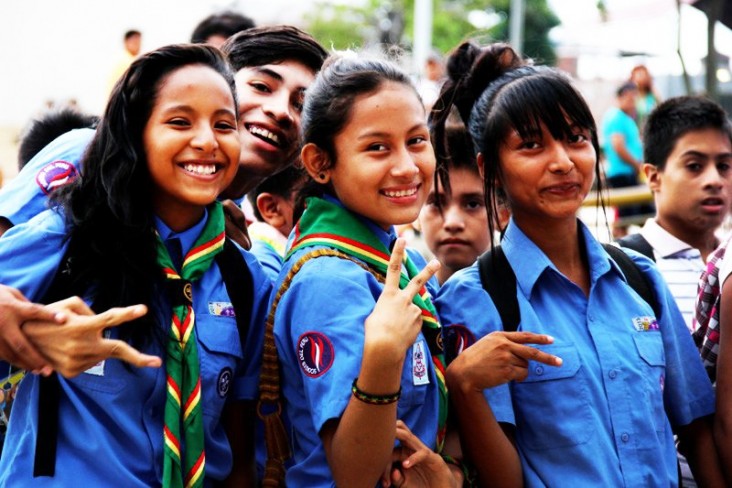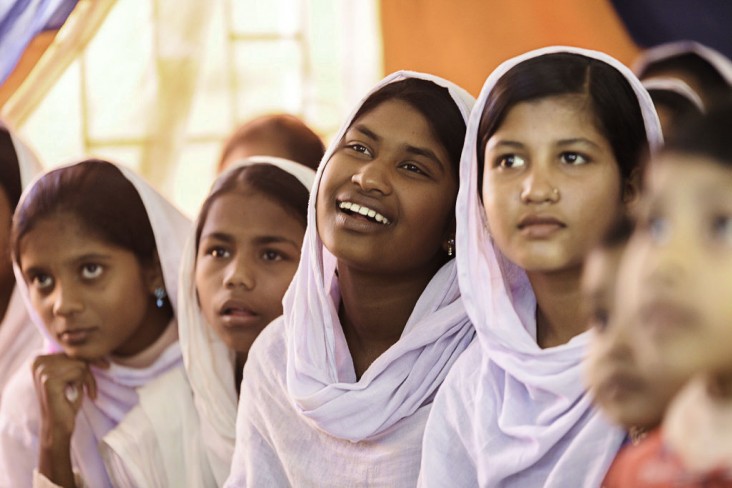- What We Do
- Agriculture and Food Security
- Democracy, Human Rights and Governance
- Economic Growth and Trade
- Education
- Ending Extreme Poverty
- Environment and Global Climate Change
- Gender Equality and Women's Empowerment
- Global Health
- Water and Sanitation
- Working in Crises and Conflict
- U.S. Global Development Lab

Women and Girls Lead Global (WGLG) combines the power of documentary film, national television broadcasts, local and new media, and engagement activities to impact audiences and support existing efforts by NGOs, civil society organizations and other actors to empower women and girls.
Around the world 62 million girls are not in school, 1 in 7 girls is married before her 15th birthday, and approximately 16 million girls between the ages of 15-19 give birth each year. While women make up more than 40% of the agriculture labor force only 3%-20% are landholders. In Africa, women-owned enterprises make up as little as 10% of all businesses. In South Asia, that number is only 3%. And despite representing half the global population, women compromise less than 20% of the world's legislators.
Empowering women and girls is key to addressing these issues, and critical to the global effort to end extreme poverty. An educated woman has a positive ripple effect on her health, family, community and society as a whole. Educated women invest 90% of their income into their family. Countries with higher levels of female secondary school enrollment have lower maternal mortality rates, infant mortality rates, lower birth rates, lower rates of HIV/AIDS, and better child nutrition.
THE PARTNERSHIP
Women and Girls Lead Global (WGLG) is a media project promoting gender equality and women’s empowerment worldwide. The partnership includes a ten-episode documentary film series each year about women and girls rising above dire circumstances to establish better lives and conditions for themselves, their families and communities. The alliance brings together ITVS’s two decades of media assets, engagement experience and global distribution network; Ford Foundation’s 75 years of global work focused on social justice and freedom of expression; USAID’s expertise and long-term investments in development; and CARE’s behavior change work, infrastructure and data.
Currently active in Bangladesh, Colombia, El Salvador, India, Jordan, Kenya, Malawi and Peru, WGLG combines the power of media with locally-led social action campaigns to engage schools and communities to take action to address the challenges faced by women and girls across the globe.

PARTNERSHIP IN ACTION
- In Bangladesh, WGLG is using film screenings to spark school conversations about gender empowerment, and introduce the “Best School for Girls” campaign in which schools compete to promote equality for girls in a range of categories. To date, partners have hosted 460 screenings and reached nearly 26,000 people in more than 100 communities, aiming to improve learning environments and lower dropout rates for female students.
- In Peru, WGLG is bringing new grassroots and media assets to an existing advocacy coalition that is working to reduce teen pregnancy. With more than 3.5 million viewers of the film, The Time is Now campaign is working to drive community action and improve adolescent sexual and reproductive health care, reduce teen pregnancy and improve girls’ education outcomes.
- In Kenya, the Women in the Red campaign is raising awareness and increasing female participation in political processes at the community, regional and national levels to help meet the national law requiring one-third of parliamentarians be female. More than 50 film screenings and accompanying engagement activities have connected potential female candidates with professional development resources. In partnership with Kenya Broadcasting Corporation (KBC) the film series has reached an audience of more than one million viewers.
- In India, film screenings and engagement activities are incentivizing communities to submit grant proposals to implement their own girls’ projects, specifically targeting men and boys in these activities focused on reducing violence against women. The program has received more than 140 community proposals, and engaged almost 15,000 participants.
- In Jordan, a peer-to-peer approach is enlisting private citizens as change agents to reduce violence against women. Film clubs provide a forum for discussion about socially sensitive topics and are complemented with online and social media campaign efforts to increase access to gender-based violence services and reporting, generate public data for research, and promote policies to reduce violence against women. The partnership is currently working through 12 film clubs as well as Jordanian television broadcasters, which has aired the film to nearly 500,000 viewers.
PARTNERS
WGLG is a public-private alliance created between USAID, Independent Television Service (ITVS), and Ford Foundation in cooperation with lead NGO partner CARE.
LEARN MORE
- WGLG Profiles [PDF, 385K]
- WGLG Graphic
- Watch the Videos
- Featured Stories:







Comment
Make a general inquiry or suggest an improvement.